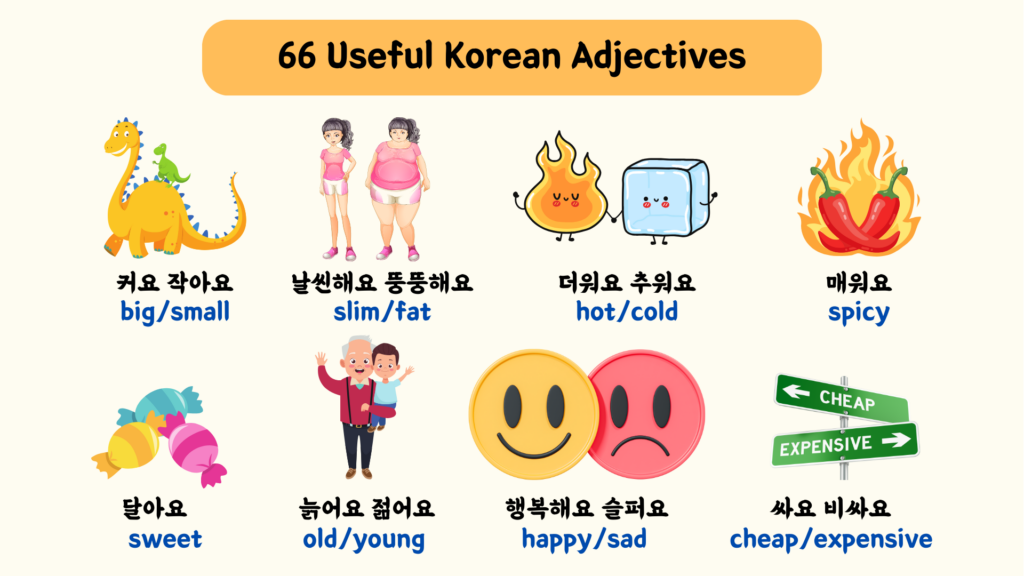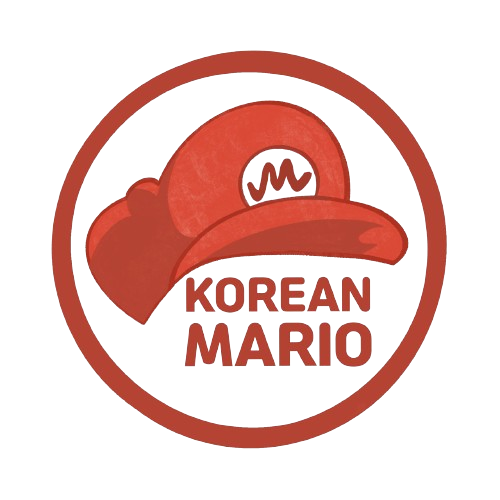
Just like how adjectives spice up sentences in English, Korean adjectives do the same, adding color and personality to otherwise bland statements. Trying to express yourself without them can make your sentences sound dull and lacking in life.
By learning a variety of Korean adjectives, you’re taking a big step towards mastering the language. Plus, you’ll have a whole new toolbox of words to make your sentences more interesting and meaningful.
The Most Useful Korean Adjectives
Learning adjectives in a language is like adding color to a painting. They help us express emotions, describe people, places, and things more vividly. Without adjectives, sentences can sound dull and lack detail. By learning adjectives, we can make our language more descriptive and engaging. They allow us to express ourselves better and paint a clearer picture of what we want to communicate. In essence, adjectives add depth and richness to our language, making it more colorful and expressive.

Small
작아요 (jag a yo)

Big
커요 (keo yo)

Few
적어요 (joeg o yo)

Many
많아요 (man a yo)

High
높아요 (nop a yo)

Low
낮아요 (naj a yo)

Short
짧아요 (jjal ba yo)

Long
길어요 (gil o yo)

Near
가까워요 (ga gga wo yo)

Far
멀어요 (mol o yo)

Slow
느려요 (neu ryeo yo)

Fast
빨라요 (bbal la yo)

Bad
나빠요 (na bba yo)

Good
좋아요 (jo a yo)

Easy
쉬워요 (swi wo yo)

Difficult
어려워요 (eo ryeo wo yo)

Cheap
싸요 (ssa yo)

Expensive
비싸요 (bi ssa yo)

Same
같아요 (gat a yo)

Different
달라요 (dal la yo)

Weak
약해요 (yak hae yo)

Strong
강해요 (gang hae yo)

Pretty
예뻐요 (ye bbeo yo)

Delicious
맛있어요 (mat isseo yo)

Tasteless
맛없어요 (mat oeb sseo yo)

Warm
따뜻해요 (dda ddeut hae yo)

Cold
추워요 (chu wo yo)

Hot
더워요 (deo wo yo)

Kind
착해요 (chak hae yo)

Scary
무서워요 (mu seo wo yo)

Poor
가난해요 (ga nan hae yo)

Happy
행복해요 (haeng bok hae yo)

Healthy
건강해요 (geon gang hae yo)

Painful
아파요 (a pa yo)

Exciting
신나요 (sin na yo)

Bored
심심해요 (sim sim hae yo)

Busy
바빠요 (ba bba yo)

Clean
깨끗해요 (ggae ggeut hae yo)

Dirty
더러워요 (deo reo wo yo)

Bright
밝아요 (bal ga yo)

Dark
어두워요 (eo du wo yo)

Quiet
조용해요 (jo yong hae yo)

Noisy
시끄러워요 (si ggeu reo wo yo)

Heavy
무거워요 (mu geo wo yo)

Light
가벼워요 (ga byeo wo yo)

Sweet
달아요 (da la yo)

Bitter
써요 (sseo yo)

Sour
셔요 (syo yo)

Spicy
매워요 (mae wo yo)

Salty
짜요 (jja yo)

Long
길어요 (gi lo yo)

Short
짧아요 (jjal ba yo)

Deep
깊어요 (gi po yo)

Shallow
얕아요 (ya ta yo)

Soft
부드러워요 (bu deu reo wo yo)

Hard
딱딱해요 (ddag ddag hae yo)

Dangerous
위험해요 (ui heom hae yo)

Safe
안전해요 (an jeon hae yo)

Funny
웃겨요 (ut gyeo yo)

Sad
슬퍼요 (seul peo yo)

Old
늙었어요 (neul geo sseo yo)

Young
젊어요 (jeol mo yo)

Narrow
좁아요 (job a yo)

Broad
넓어요 (neol beo yo)

Fat
뚱뚱해요 (ddung ddung hae yo)

Slim
날씬해요 (nal ssin hae yo)
Learning adjectives in Korean is important because they enable us to express ourselves more vividly and accurately. By mastering Korean adjectives, we can describe the world around us with greater precision, convey emotions more effectively, and create more engaging and expressive communication. Additionally, understanding adjectives enhances our comprehension of Korean texts and conversations, allowing us to fully appreciate and engage with the language and culture.
In this lesson, we’ve explored 66 adjectives in Korean, which are like the paintbrushes of language, adding color and vibrancy to our sentences. By mastering these adjectives, we can express ourselves more vividly, describing people, places, and experiences with greater detail and emotion. Just as colors bring a painting to life, adjectives breathe life into our language, allowing us to create more engaging and expressive communication. Keep practicing and incorporating these adjectives into your conversations, and watch as your language skills flourish with newfound depth and richness.

